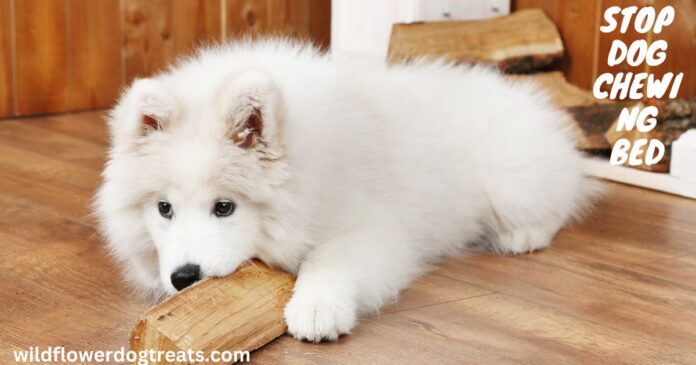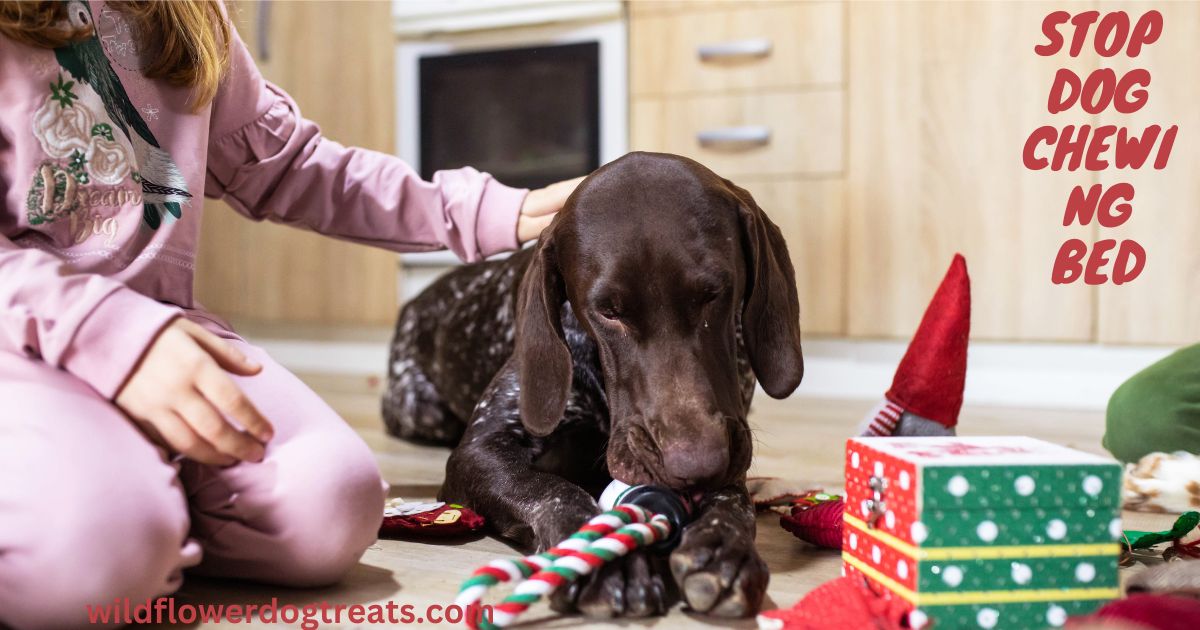To stop a dog from chewing his bed, redirect his attention to appropriate chew toys and provide mental and physical stimulation. Many dog owners have dealt with the frustrating and costly habit of their furry friend chewing up their bed.
Not only can this behavior lead to the destruction of expensive bedding, but it may also pose a safety risk if the dog ingests any harmful materials. Fortunately, there are effective ways to put a stop to this destructive chewing habit.
By redirecting your dog’s attention to appropriate chew toys and providing him with mental and physical stimulation, you can discourage him from chewing on his bed. Implementing these techniques will not only save you money on replacing bedding but will also result in a happier and healthier dog. So let’s explore some helpful strategies to prevent your beloved pet from devouring his cozy resting place.
Understanding The Root Cause Of Bed Chewing
Bed chewing can be a frustrating behavior for dog owners to deal with. Not only does it result in the destruction of expensive bedding, but it can also be a sign of an underlying problem. In order to effectively stop a dog from chewing his bed, it’s important to understand the root cause behind this behavior.
Why Do Dogs Chew Their Beds?
There are several reasons why dogs engage in bed chewing. By understanding these reasons, we can address the issue more effectively.
Common Behavioral And Medical Reasons For Bed Chewing
Dogs may chew their beds due to various behavioral and medical reasons. It’s important to differentiate between the two in order to find the appropriate solution.
Behavioral reasons:
- Boredom: Dogs that are not provided with enough mental stimulation and physical exercise may turn to bed chewing as a way to alleviate their boredom.
- Anxiety or stress: Dogs that experience anxiety or stress may resort to chewing as a way to self-soothe. This can be triggered by changes in their environment, separation anxiety, or other underlying issues.
- Tendency to chew: Some dogs have a natural inclination to chew, especially during their teething stage. If they don’t have appropriate chewing outlets, they may turn to their beds.
Medical reasons:
- Dental problems: Dogs with dental issues, such as gum disease or tooth decay, may chew their beds in an attempt to relieve discomfort or irritation in their mouths.
- Malnutrition: A lack of essential nutrients in a dog’s diet can lead to pica, a condition where dogs will chew non-food items, including their beds.
- Medical conditions: Certain medical conditions, such as gastrointestinal problems or parasites, can cause dogs to chew their beds as a result of discomfort or pain.
Recognizing The Signs Of Stress Or Anxiety In Dogs
In order to address bed chewing caused by stress or anxiety, it’s crucial to be able to recognize the signs of these emotions in your dog. Some common signs of stress or anxiety in dogs include:
- Pacing or restlessness
- Panting excessively
- Excessive barking or whining
- Destroying furniture or other objects
- Loss of appetite
- Withdrawal or avoidance behavior
Identifying these signs can help you take appropriate measures to alleviate your dog’s stress and prevent bed chewing in the future.
Creating A Safe And Stimulating Environment
To prevent your dog from chewing his bed, create a safe and stimulating environment by providing plenty of chew toys, regular exercise, and mental stimulation. Redirect his chewing behavior towards appropriate items and reinforce good behavior with positive rewards. Consistency and patience are key to breaking this habit.
Creating a Safe and Stimulating Environment When it comes to preventing your dog from chewing his bed, creating a safe and stimulating environment is essential. By providing appropriate chew toys as an alternative, utilizing interactive toys and puzzles, and implementing a regular exercise routine, you can help redirect your dog’s instinct to chew and keep him mentally and physically engaged.
Providing Appropriate Chew Toys As An Alternative
One of the most effective ways to prevent your dog from chewing his bed is by providing him with appropriate chew toys as an alternative. These toys should be durable, safe, and interesting enough to keep his attention. Look for toys specifically designed for chewing, such as rubber or nylon toys, as they tend to withstand heavy chewing. Here are some factors to consider when choosing chew toys for your dog:
- Size: Make sure the chew toy is appropriately sized for your dog to prevent any choking hazards.
- Texture: Dogs have different preferences when it comes to textures, so offer a variety of options like soft, hard, or textured toys to see what your dog prefers.
- Flavor: Some chew toys come in different flavors, such as peanut butter or bacon, which can make them even more enticing for your dog.
Utilizing Interactive Toys And Puzzles
In addition to chew toys, incorporating interactive toys and puzzles into your dog’s routine can help redirect his chewing behavior. These toys require mental engagement and problem-solving skills, providing your dog with a challenging and stimulating experience. Consider the following interactive toys and puzzles:
- Treat-dispensing toys: These toys allow you to hide treats inside, encouraging your dog to work for his reward.
- Puzzle toys: These toys have compartments or hidden compartments where you can hide treats, stimulating your dog’s problem-solving abilities.
- Scent games: Hide a treat or a toy with a strong scent, like anise or lavender, and let your dog search for it using his nose.
Implementing A Regular Exercise Routine
Regular exercise is crucial for a dog’s overall well-being and can significantly reduce destructive behaviors such as chewing. By ensuring your dog gets enough physical activity, you can tire him out and provide an outlet for his energy. Here are some types of exercise you can incorporate into your dog’s routine:
- Daily walks: Take your dog for regular walks to provide both mental and physical stimulation.
- Play fetch: Engage in interactive games of fetch to encourage running and chasing, which can help burn off excess energy.
- Agility training: Set up an agility course in your backyard or attend classes to keep your dog physically and mentally active.
Remember, maintaining a safe and stimulating environment is key to stopping your dog from chewing his bed. By providing appropriate chew toys, utilizing interactive toys and puzzles, and implementing a regular exercise routine, you can redirect his chewing behavior and keep him happy and healthy.
Correcting And Redirecting Undesired Behaviors
When it comes to stopping a dog from chewing his bed, correcting and redirecting undesired behaviors play a crucial role in the training process. Dogs chew their beds for various reasons, such as teething, boredom, or anxiety. By implementing positive reinforcement training techniques, using deterrent sprays and tastes, as well as redirecting your dog’s attention to approved chew items, you can effectively discourage destructive chewing behaviors and provide your furry friend with a safe and appropriate outlet for their natural chewing instincts.
Positive Reinforcement Training Techniques
Positive reinforcement is a powerful tool in shaping a dog’s behavior. It involves rewarding desired behaviors to encourage their repetition. When it comes to stopping your dog from chewing his bed, positive reinforcement can be used to reinforce appropriate chewing habits.
- Identify appropriate chew items for your dog, such as chew toys made of durable materials.
- Whenever you catch your dog chewing on an approved item, shower them with praise and give them a treat. This positive association will help them understand what is acceptable to chew on.
- If you notice your dog attempting to chew his bed, immediately redirect their attention to an approved chew item and reward them for engaging with it.
Using Deterrent Sprays And Tastes
If positive reinforcement alone is not enough to deter your dog from chewing his bed, using deterrent sprays and tastes can be an effective solution. These products are designed to make the bed unappealing to your dog’s senses, discouraging them from chewing.
Here’s how you can use deterrent sprays and tastes to stop your dog from chewing his bed:
- Choose a pet-safe deterrent spray or taste that is specifically formulated to deter chewing behaviors.
- Apply the deterrent spray directly to the bed according to the product’s instructions. The bitter taste or unpleasant scent will discourage your dog from chewing.
- Ensure you select a deterrent that is safe for your dog’s health and won’t damage the bed fabric. Check the ingredients and consult with a veterinarian if needed.
Redirecting Your Dog’s Attention To Approved Chew Items
Another effective way to stop your dog from chewing his bed is by redirecting their attention to approved chew items. By providing alternative options, you can satisfy their natural urge to chew while protecting their bed.
Follow these steps to redirect your dog’s attention:
- Keep approved chew toys readily available in your dog’s designated area.
- When you catch your dog chewing his bed, calmly take it away and replace it with an approved chew toy.
- Encourage your dog to engage with the chew toy by using positive reinforcement techniques, such as praise or treats.
By consistently implementing these strategies, you can help your furry friend develop appropriate chewing habits and ensure their bed stays intact. Remember, patience and consistency are key in training your dog to stop chewing his bed. With time and positive reinforcement, you’ll see progress and have a happier, chew-free home.
Addressing Medical Issues Or Discomfort
When your dog continuously chews on his bed, it could be a sign of an underlying medical issue or discomfort. It’s important to address these potential problems in order to stop the behavior effectively.
Consulting With A Veterinarian For A Thorough Examination
If your dog is persistently chewing his bed, it’s crucial to consult with a qualified veterinarian. A thorough examination by a professional will help identify any medical issues or discomfort your dog may be experiencing. This approach ensures that the root cause of the chewing behavior is effectively identified and addressed.
Treating Dental Problems Or Oral Discomfort
Dental problems or oral discomfort can lead to excessive chewing. If your dog has dental issues or oral pain, it can cause him to seek relief by chewing on his bed. By treating any dental problems, such as gum disease or tooth decay, you can alleviate your dog’s discomfort and discourage the destructive chewing behavior.
Identifying And Managing Any Underlying Medical Conditions
Identifying and managing any underlying medical conditions is crucial in addressing your dog’s destructive chewing. Conditions such as anxiety, gastrointestinal problems, or skin irritation can contribute to the behavior. Managing these medical conditions through proper treatment and care can help eliminate the underlying cause of the problem, ultimately stopping your dog from chewing his bed.
Establishing Consistent Bedtime Routines
One effective way to stop a dog from chewing his bed is by establishing consistent bedtime routines. Dogs thrive on routine, and a structured bedtime routine can help alleviate anxiety and reduce the likelihood of bed chewing behavior. Here are some strategies to help you establish and maintain consistent bedtime routines for your furry friend:
Creating A Designated Sleep Area For Your Dog
Designating a specific area for your dog to sleep can help create a sense of security and comfort. Whether it’s a cozy dog bed or a crate, providing a designated sleep area helps your dog understand where he should rest, reducing the risk of bed chewing out of confusion or anxiety.
Utilizing Crate Training To Discourage Bed Chewing
Crate training can be a valuable tool in preventing bed chewing behavior. By introducing your dog to a comfortable crate and using positive reinforcement techniques, you can create a safe and secure space for your dog to sleep. This can help minimize the urge to chew on his bed, as the crate becomes a comforting and enjoyable place to rest.
Gradual Desensitization To The Bed Chewing Behavior
If your dog has already developed a habit of chewing his bed, it’s important to address the behavior gradually. By using gradual desensitization techniques and consistently redirecting the behavior, you can help your dog break the habit. This may involve providing alternative chew toys and rewarding positive behavior, ultimately steering your dog away from bed chewing.
Frequently Asked Questions For How To Stop A Dog From Chewing His Bed
How Do I Stop My Dog From Chewing His Bed?
To prevent your dog from chewing his bed, provide plenty of chew toys, exercise your dog regularly, and use deterrent sprays or repellents on the bed. Additionally, consider crate training and seek guidance from a professional trainer if the behavior persists.
Why Do Dogs Chew Their Beds?
Dogs may chew their beds due to boredom, anxiety, teething, or a lack of proper chew toys. Ensuring regular exercise, mental stimulation, and addressing any underlying anxiety or behavioral issues can help deter this behavior.
What Are Safe Chew Toys For Dogs?
Safe chew toys for dogs include rubber toys, nylon bones, and durable puzzle toys. Look for toys labeled as non-toxic, durable, and made specifically for dogs to ensure safety. Avoid toys with small parts that could be a choking hazard.
Regularly inspect toys for signs of wear and tear.
How Can I Teach My Dog Not To Chew?
To teach your dog not to chew, provide appropriate chew toys, give positive reinforcement when they chew the right items, redirect them when they chew on inappropriate items, and use deterrent sprays or bitter-tasting products as needed. Consistency and patience are key in this training process.
Conclusion
To wrap it up, preventing your dog from chewing his bed requires a combination of addressing underlying causes and providing appropriate alternatives. By identifying potential medical issues, maintaining a consistent routine, and providing mental stimulation and chew toys, you can redirect your dog’s chewing behavior.
Remember, patience and consistency are key to successfully breaking this habit. With proper guidance and care, you can ensure your dog has a comfortable bed without the undesirable chewing.




